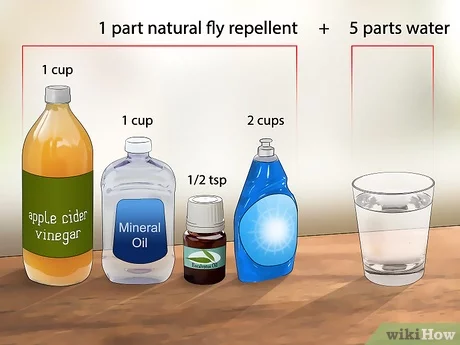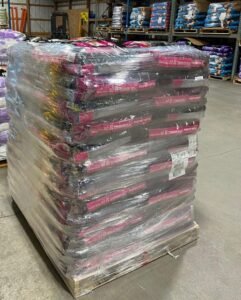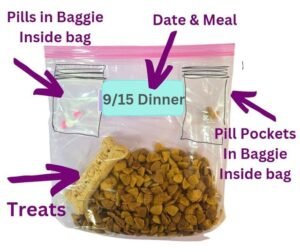Flies can be a real nuisance for dogs. They buzz around, land on your pet, and can even cause discomfort. So let’s jump in: How Can I Keep Flies off My Dog?
Keeping flies away is important for your dog’s health and happiness. Flies are not just annoying; they can spread diseases and irritate your dog’s skin. Many dog owners face this problem, especially in warm weather. Understanding how to keep flies off your furry friend can make a big difference.
Simple strategies can help protect your dog from these pests. You want your dog to be comfortable and safe. In this guide, you will find effective tips to keep flies away. Let’s explore how to create a fly-free environment for your beloved pet.
Table of Contents
The Buzz About Flies And Dogs
Flies can be a real nuisance for dogs. They buzz around, trying to land on your pet. Understanding why flies are attracted to dogs is key. Keeping your dog safe from these pests is important. Let’s explore the factors that attract flies and the health risks they pose.
Attraction Factors
Flies are drawn to dogs for several reasons. Here are the main attraction factors:
- Odors: Dogs can smell interesting to flies. Sweat and natural oils attract them.
- Food: Leftover food or treats can bring flies close. Always clean up after feeding.
- Waste: Dog waste is a major attractant. Flies love to lay eggs in it.
- Warmth: Dogs generate heat. Flies are attracted to warm areas.
Health Risks
Flies can pose serious health risks to dogs. Here are some potential dangers:
| Health Risk | Description |
|---|---|
| Infections | Flies can carry bacteria. They may spread infections to your dog. |
| Parasites | Some flies can carry parasites. These can harm your dog’s health. |
| Allergic Reactions | Fly bites can cause allergic reactions. Watch for swelling and itching. |
Protecting your dog from flies is essential. Keep your pet healthy and happy.

Credit: www.wikihow.com
Regular Grooming Tactics
Keeping flies off your dog requires regular grooming. Flies are attracted to dirt, sweat, and odors. A clean dog is less appealing to these pests. Here are some effective grooming tactics to help.
Bathing Routines
Establish a consistent bathing routine for your dog. This helps remove dirt and odors that attract flies. Aim to bathe your dog every 2 to 4 weeks. Adjust this based on your dog’s activity level and coat type.
- Use a gentle dog shampoo.
- Rinse thoroughly to remove all soap.
- Dry your dog well to prevent moisture.
Consider the following tips:
- Choose a warm, calm environment.
- Use treats to make bathing enjoyable.
- Check for skin irritations during baths.
Coat Maintenance
Regular coat maintenance is essential. Brushing helps remove loose fur and dirt. It also distributes natural oils in the coat.
Follow these coat maintenance tips:
- Brush your dog at least once a week.
- Use the right brush for your dog’s coat type.
- Look for mats or tangles regularly.
Consider the weather too. During warmer months, more frequent grooming helps keep your dog cool. It also reduces odors that attract flies.
| Coat Type | Recommended Brush | Brushing Frequency |
|---|---|---|
| Short Hair | Slicker Brush | Once a week |
| Medium Hair | Pin Brush | Twice a week |
| Long Hair | Wide-Tooth Comb | Every other day |
Dietary Adjustments For Prevention
Keeping flies away from your dog can start with what they eat. Certain dietary changes can help. These changes can make your dog less appealing to flies. Let’s explore how nutrition plays a role in fly prevention.
Nutritional Supplements
Nutritional supplements can boost your dog’s health. Some can also deter flies. Consider the following supplements:
- Omega-3 fatty acids: These support skin health.
- Probiotics: They improve digestion.
- Zinc: Helps maintain a healthy coat.
Adding these to your dog’s diet can help. Consult your vet before starting any supplements. They can recommend the right type and dose.
Natural Repellents Through Diet
Some foods naturally repel flies. Including these in your dog’s diet can help:
| Food | Benefit |
|---|---|
| Garlic | Repels insects, including flies. |
| Peppermint | Acts as a natural fly repellent. |
| Apple Cider Vinegar | Improves digestion and repels flies. |
Mix small amounts of these foods into your dog’s meals. Start slow to avoid stomach upset. Monitor your dog for any reactions. Adjust as needed.
Dietary changes can reduce fly attraction. This simple step can make a big difference.
Environmental Control Strategies
Keeping flies away from your dog is important. Flies can cause discomfort and spread diseases. Using environmental control strategies can help you manage this issue. Here are two key areas to focus on: cleanliness and yard maintenance.
Clean Living Spaces
Start by keeping your dog’s living area clean. Flies are attracted to food and waste. Follow these steps:
- Clean up food spills quickly.
- Wash your dog’s bedding regularly.
- Dispose of dog waste daily.
- Keep food bowls clean and fresh.
A clean environment reduces fly attraction. Regular cleaning should be part of your routine. Set reminders to help you stay on track.
Yard Maintenance
A well-maintained yard can keep flies away. Follow these maintenance tips:
- Trim grass regularly.
- Remove standing water.
- Dispose of yard waste promptly.
- Plant fly-repelling herbs like basil or mint.
These steps reduce flies in your yard. A tidy space encourages your dog to play safely.
Regular maintenance makes a big difference. Check your yard often for any issues. Keeping both indoor and outdoor areas clean helps protect your dog.
Chemical Repellents: Pros And Cons
Keeping flies away from your dog can be tough. Chemical repellents offer a quick solution. They can help protect your pet from annoying flies. But they also come with risks. Understanding the pros and cons is important before using them.
Commercial Sprays
Many companies sell sprays designed to keep flies away. These products often contain strong chemicals. Here are some common types:
- Aerosol sprays: Easy to apply but may contain harmful ingredients.
- Natural sprays: Made from essential oils. Safer but may be less effective.
- Long-lasting formulas: Provide extended protection but can be harsh on skin.
Always read the label. Check for safety instructions. Some sprays are not safe for pets.
Safety Considerations
Using chemical repellents requires caution. Here are some safety tips:
- Choose pet-friendly products. Look for labels that say “safe for pets.”
- Test the spray on a small area first. Watch for any reactions.
- Keep sprays away from eyes and mouth. Avoid contact with sensitive areas.
- Store products out of reach. Keep them away from curious pets.
Consult your vet before using any chemical repellent. They can recommend safe options for your dog. Be aware of signs of irritation. If your dog shows discomfort, stop using the product immediately.
Natural Remedies To Repel Flies
Flies can be a nuisance for dogs and their owners. Using natural remedies can help keep these pests away. These solutions are safe and easy to make. They also avoid harmful chemicals. Here are some effective methods.
Essential Oil Blends
Essential oils can repel flies effectively. They are natural and smell good. Here are some oils to consider:
- Lavender Oil – Calming scent that flies dislike.
- Peppermint Oil – Strong scent that acts as a natural repellent.
- Eucalyptus Oil – Known for keeping bugs at bay.
To create an essential oil blend:
- Mix 10 drops of each oil in a small bottle.
- Add 2 tablespoons of carrier oil like coconut oil.
- Shake well before each use.
Apply this blend to your dog’s collar or fur. Avoid sensitive areas like eyes and nose.
Homemade Herbal Sprays
Herbal sprays can also keep flies away. They are easy to make and safe for pets. Here’s a simple recipe:
- Gather herbs like rosemary, basil, and mint.
- Boil two cups of water.
- Add one cup of chopped herbs.
- Let it steep for 30 minutes.
- Strain the mixture and let it cool.
- Pour the spray into a bottle.
Spray this solution on your dog’s fur and around their living area. Reapply every few days for best results.
Use these natural remedies to protect your dog from flies. They are safe, effective, and easy to make. Enjoy the summer without the buzz of flies!
Innovative Fly Control Gear
Keeping flies away from your dog can be challenging. Luckily, there are new tools that help. These tools make it easier to protect your furry friend. Here are two effective types of gear: specialized dog wear and fly traps or zappers.
Specialized Dog Wear
Specialized dog wear is designed to keep flies off your pet. These clothes are made from special materials. They cover your dog’s body and prevent flies from landing.
- Fly-Repellent Coats: These coats have built-in repellents.
- Lightweight Mesh Clothing: This clothing allows airflow and blocks flies.
- Protective Boots: Boots can protect paws from bites.
Look for materials that are breathable. Your dog should feel comfortable wearing them. Choose bright colors, as they may help distract flies.
Fly Traps And Zappers
Using fly traps and zappers can reduce fly populations. They can be placed around your yard. Here are some options:
| Type | Description | Effectiveness |
|---|---|---|
| Sticky Traps | These traps catch flies on sticky surfaces. | Very effective in small areas. |
| Electric Zappers | These devices kill flies on contact. | Quick and effective. |
| Ultrasonic Repellers | These emit sounds that repel flies. | Less effective but safe. |
Place traps in shaded areas. Flies are attracted to food and waste. Keep your yard clean to enhance effectiveness. Regularly check and replace traps when full.

Credit: www.youtube.com
Understanding Dog Behavior And Fly Interactions
Dogs interact with their environment in unique ways. Understanding these behaviors helps to keep flies away. Flies can annoy your dog and cause stress. Knowing where flies are likely to appear is important. It helps in creating a comfortable space for your pet.
Resting Spots
Flies love warm, sunny places. Your dog’s favorite resting spots may attract them. Observe where your dog likes to relax. Common resting spots include:
- Backyards
- Decks
- Near trees
- Inside the house
Keep these areas clean. Remove any food scraps or waste. Flies are drawn to smells. Regularly wash your dog’s bedding. This reduces odors that attract flies.
Activity Levels
Active dogs can attract flies. When dogs run or play, they may stir up flies. High activity levels can bring flies close. Observe your dog’s play areas:
| Activity | Fly Attraction Level |
|---|---|
| Playing Fetch | High |
| Walking | Medium |
| Resting | Low |
Limit play in fly-prone areas. Create shaded spots for rest. Provide fresh water to keep your dog hydrated and cool. This helps reduce fly attraction.
Professional Advice And Veterinary Solutions
Flies can be a nuisance for dogs. They can cause discomfort and health issues. Seeking professional advice and veterinary solutions is vital. Vets provide valuable insights and treatments to protect your pet.
When To Consult A Vet
Knowing when to visit the vet can help your dog. Here are signs that indicate a vet visit is necessary:
- Excessive scratching or biting at the skin.
- Red, inflamed, or irritated skin.
- Visible wounds or sores.
- Signs of infection, like discharge or odor.
- Persistent discomfort or unusual behavior.
Don’t wait. Early intervention can prevent serious issues.
Prescription Treatments
Veterinarians may suggest several prescription treatments. These can help keep flies away effectively. Here are common options:
| Treatment | Description |
|---|---|
| Topical Treatments | Apply directly to the skin. These repel flies. |
| Oral Medications | Pills that reduce fly attraction and improve skin health. |
| Injections | Long-lasting solutions for serious infestations. |
Always follow your vet’s instructions. This ensures the best results for your dog.
Monitoring And Adjusting Your Strategy
To keep flies away from your dog, you need to monitor your methods. Adjusting your strategy helps improve results. Every dog is different. What works for one might not work for another. Stay attentive and ready to change your approach.
Keeping A Fly-free Log
Documenting your efforts is crucial. A fly-free log can help track what works. Here’s how to set it up:
- Choose a notebook or a digital app.
- Record dates and times of fly activity.
- Note the products or methods used.
- Write observations about your dog’s behavior.
This log helps identify patterns. You can see what times of day have more flies. Use this data to adjust your strategy. For example, if flies are worse in the evening, increase repellents then.
Seasonal Considerations
Flies behave differently in each season. Understanding these changes can help. Here’s a seasonal breakdown:
| Season | Fly Activity | Recommended Actions |
|---|---|---|
| Spring | Increased activity as temperatures rise. | Use repellents regularly. |
| Summer | Peak fly season. High temperatures. | Keep your dog indoors during peak hours. |
| Fall | Flies begin to decrease. | Reduce repellents, but stay alert. |
| Winter | Minimal fly activity. | Focus on cleaning and prevention. |
Stay aware of seasonal changes. Adjust your fly-control methods accordingly. This ensures your dog stays comfortable all year.
Frequently Asked Questions
How Can I Prevent Flies From Bothering My Dog?
To prevent flies from bothering your dog, keep their living area clean. Regularly dispose of waste and clean up food spills. You can also use fly repellents specifically designed for pets. Additionally, consider using fly traps around your yard to reduce their presence.
Are There Natural Fly Repellents For Dogs?
Yes, there are several natural fly repellents for dogs. Essential oils like lavender and eucalyptus can deter flies. However, always dilute oils properly and consult your veterinarian. Herbal sprays can also be effective and are safe for pets. Always test on a small area first.
What Attracts Flies To My Dog?
Flies are attracted to moisture, food, and odors. Dogs that are dirty or have wounds may attract more flies. Ensure your dog is clean and healthy to minimize attraction. Regular grooming and bathing can help keep flies at bay.
Can Flies Harm My Dog?
Yes, flies can harm dogs in various ways. They can irritate the skin and spread diseases. Some species, like the botfly, can lay eggs in wounds. This can lead to serious health issues. Always monitor your dog for unusual behavior or signs of irritation.
Conclusion
Keeping flies away from your dog is important for their health. Use natural repellents like essential oils or vinegar. Regular grooming helps remove dirt and odors that attract flies. Create a clean environment by removing food scraps and waste. Consider using fly traps in your yard.
Always keep an eye on your dog’s skin for irritation. These simple steps can help your dog stay comfortable and happy. Enjoy your time with your furry friend, free from pesky flies. A little effort goes a long way in keeping them safe.



